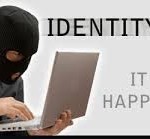 It should come as no surprise that identify theft is out of control with more than 9 million Americans falling victim EACH YEAR. If you carry your credit card and driver’s license, make purchases online, or simply buy lunch with a debit card, you are putting yourself at risk for identity theft. Unfortunately, fewer than one in 700 identify crimes lead to an arrest.
It should come as no surprise that identify theft is out of control with more than 9 million Americans falling victim EACH YEAR. If you carry your credit card and driver’s license, make purchases online, or simply buy lunch with a debit card, you are putting yourself at risk for identity theft. Unfortunately, fewer than one in 700 identify crimes lead to an arrest.
No doubt you have heard about the theft of millions of credit and debit card numbers as well as personal information from the data bases of Target, Michaels, Neiman Marcus, Walgreens, Nordstrom, Zappos.com, Choicepoint, Lexis Nexis, DSW Show Warehouse, TJ Maxx, HSBC, and Bank of America. Data hackers are operating more like a business with sophisticated networks of criminals who are hawking our identities. Criminals are looking to get the maximum yield of monetizable data and the retail industry is an easy target. Once the hackers have your information, they either use it themselves or sell to other thieves. With your personal information, they have access to your credit history. If you have high credit scores, criminals will then use your information to open new bank accounts, take out mortgages and other large loans, as well as new credit cards. Victims are unaware of these new accounts until the creditor seeks overdue payments.
You might think that if you have bad credit, you are safe from this type of identity theft. WRONG! Even if you have less than perfect credit, thieves can use your personal information to obtain payday loans or other small amount, high interest loans. It would also be possible for the thief to get a low limit credit card. Your identity could also be used for criminal identity theft, medical identity theft, or government identity theft.
With criminal identity theft, your information is used by someone with a criminal record avoid being arrested. The criminal obtains a fraudulent driver’s license with your personal information but with their picture. When they get pulled over, they give the officer the fraudulent driver’s license. They receive a ticket but avoid being arrested. As you would guess, they do not show up for traffic court or pay their fine. Now you have a warrant out for your arrest. Guess what happens next time you get pulled over? You get arrested!
Medical identity theft happens when someone uses your personal information to obtain medical treatment without your knowledge or consent. A social security number is not required, only your name, date of birth, and address. Thieves also do not care if you have medical insurance or not. Medical treatment is received in your name and later you will receive the bills. Your medical history will also be compromised. The prescription meds, treatment for diseases, surgeries, etc., will show up on your medical history. This may make it hard for you to get the prescriptions needed, proper diagnosis of illnesses, or proper treatment in an emergency situation.
Government identity theft occurs when a thief uses a stolen taxpayer’s SSN to fraudulently file a tax return and claim a refund early in the filing season. The taxpayer finds out when they file their tax return later in the season. The IRS says to be alert to possible identity theft if you receive an IRS notice that states:
- More than one tax return for you was filed,
- You have a balance due, refund offset or have had collection actions taken against you for a year you did not file a tax return, or
- IRS records indicate you received wages from an employer unknown to you.
According to the Federal Trade Commission’s Identity Theft: What to Know – What to Do, other methods used by identity thieves to obtain information about you include:
- Going through trash cans and dumpsters, stealing bills and documents that have sensitive information.
- Working for businesses, medical offices, or government agencies, and steal personal information on the job.
- Misusing the name of a legitimate business, and call or send emails that trick you into revealing personal information.
- Pretending to offer a job, a loan, or an apartment, and ask you to send personal information to “qualify.”
- Stealing your wallet, purse, backpack, or mail, and remove your credit cards, driver’s license, passport, health insurance card, and other items that show personal information.
Even if you have not been affected directly by identity theft, you will be in the form of increased prices in stores as well as increased bank fees. You are always a target and identity thieves are always on the prowl. Next month, I will discuss ways that you can protect yourself.
